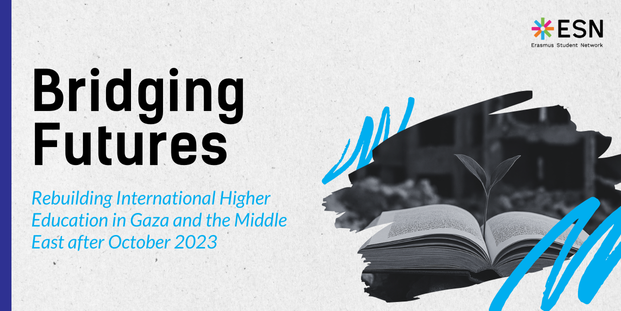
Erasmus Student Network (ESN) has launched Bridging Futures: Rebuilding International Higher Education in Gaza and the Middle East after October 2023, a vital policy paper addressing the analysis of the collapse of Gaza’s academic sector in the aftermath of the escalation that began on 7 October 2023. This policy paper examines the multifaceted challenges facing Gaza’s universities, students and educators, and proposes a compelling framework to restore academic resilience.
The conflagration that erupted in October 2023 has wrought unprecedented damage upon Gaza’s educational infrastructure. The report underscores the devastating toll on education: 90,000 students displaced, over 10,000 students and educators killed, and 90% of educational infrastructure destroyed. Amidst infrastructural ruin, travel restrictions, and psychological trauma, Gaza’s youth face unparalleled barriers to learning and mobility, threatening both academic progress and the region’s long-term recovery. Beyond the immediate human cost, damage to laboratories, libraries, and digital networks has fragmented academic activities and isolated Gaza’s institutions from international peers.
ESN’s blueprint for action centres on four pillars:
1. Establish an Emergency Education Fund for Gaza
ESN urges the creation of a dedicated sub-fund within the Erasmus+ framework to address both immediate and long-term needs. Establishing an Emergency Education Fund under Erasmus+ to finance reconstruction, scholarships, and digital learning tools, mirroring successful EU initiatives in Ukraine.
2. Promote an Erasmus+ Initiative Responsive to Conflict Contexts
ESN encourages adapting Erasmus+ programmes with hybrid mobility models and flexible eligibility criteria to overcome mobility barriers. By adopting lessons from the Ukrainian context - where Erasmus+ was broadened to encompass pupils, vocational learners and educational personnel - this initiative would reaffirm Europe’s commitment to inclusive education, even under siege.
3. Forge Institutional Partnerships for Reconstruction
ESN urges European universities to establish bilateral and multilateral ties with Gaza-based institutions, centred on knowledge exchange, capacity-building projects, and student-led initiatives.
4. Advocating globally for academic freedom as a fundamental human right.
As ESN propels this report into the spotlight, it invites policymakers, academia and civil society to translate solidarity into tangible outcomes. Emphasising education as a lifeline for resilience and peace, ESN calls for urgent international solidarity to transform rhetoric into action. In doing so, we reaffirm a fundamental truth: that education is not a casualty of conflict, but an imperative of peace.
By integrating Gaza into global academic frameworks, the EU and its partners can safeguard the right to education, rebuild intellectual capital, and foster sustainable recovery - a responsibility vital not only for Gaza’s future but for global equity in education.


Follow ESN